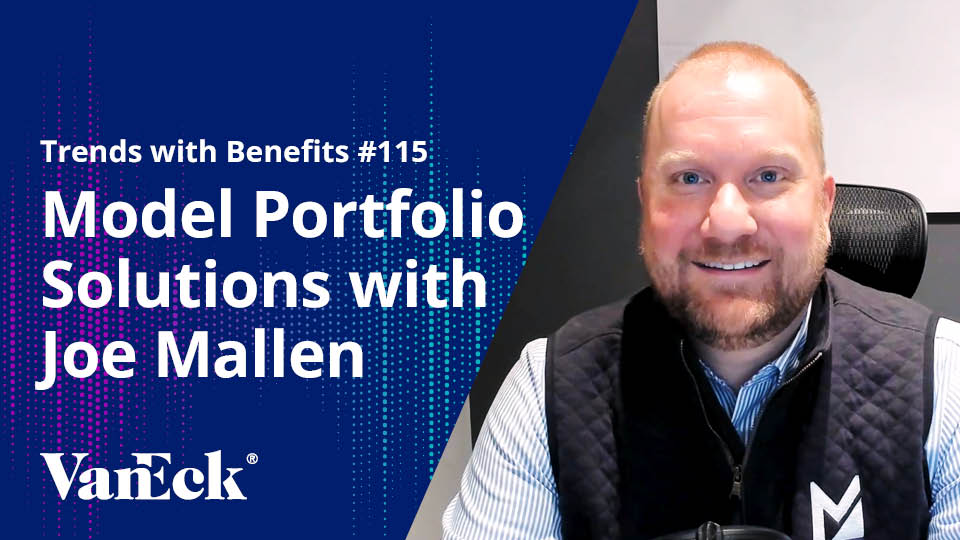Trends with Benefits #101: The Macro Economy and Institutional Investing with Tavis McCourt
June 06, 2023
Listen Time 35:20 MIN
This episode is jam-packed with all the info you need to catch up on what’s happening in the economy. I am joined by Tavis McCourt, Institutional Equity Strategist at Raymond James. Tavis discusses the tightness of the labor market and the excess of white-collar labor in the U.S. He breaks down the impact of slowing consumer spending on inflation and earnings. Tavis offers insight into the portfolio positioning of institutional investors and what retail investors can learn from this. We also discuss the pricing of small, mid, and large-cap equities.
If you’re looking to invest in the rise of AI, Tavis explains that the companies that will be successful in the long run are those that can use AI to create a natural monopoly. What’s another option? Investing in what’s already driving the growth of AI.
Show Notes:
02:48 U.S. Economy Overview
03:54 Consumer Spending
05:34 Labor Market and Salaries
10:50 Rates and Inflation
19:26 Institutional Investing Trends
23:57 Small-Cap Stocks
29:37 Long-Term Trend
33:35 Trend or Fad
Trend or Fad
Listen for Tavis’s take on cryptocurrency, T-bills, wellness companies, ice baths, and “buy now, pay later.”
Follow Ed Lopez @thatEdLopez on Twitter.
To receive more Trends with Benefits insights, sign up in our subscription center.
Related Topics
Related Insights
April 16, 2024
March 19, 2024
March 05, 2024
IMPORTANT DISCLOSURES
Please note that VanEck may offer investments products that invest in the asset class(es) or industries included in this video.
The views and opinions expressed are those of the speaker and are current as of the video’s posting date, and are not necessarily those of VanEck or its employees. Video commentaries are general in nature and should not be construed as investment advice. References to specific securities and their issuers or sectors are for illustrative purposes only. This is not an offer to buy or sell, or a recommendation to buy or sell any of the securities/financial instruments mentioned herein. The information presented does not involve the rendering of personalized investment, financial, legal, or tax advice. Certain statements contained herein may constitute projections, forecasts and other forward looking statements, which do not reflect actual results, are valid as of the date of this communication and subject to change without notice. Information provided by third party sources are believed to be reliable and have not been independently verified for accuracy or completeness and cannot be guaranteed. VanEck does not guarantee the accuracy of third party data.
There are inherent risks with equity investing. These risks include, but are not limited to stock market, manager, or investment style. Stock markets tend to move in cycles, with periods of rising prices and periods of falling prices.
Investing in international markets carries risks such as currency fluctuation, regulatory risks, economic and political instability. Emerging markets involve heightened risks related to the same factors as well as increased volatility, lower trading volume, and less liquidity. Emerging markets can have greater custodial and operational risks, and less developed legal and accounting systems than developed markets.
Investments in large cap stocks may grow more slowly than the overall market. Value stocks may perform differently from the market as a whole and may be undervalued by the market for a long period of time. Investments in small cap stocks may be more volatile than those of larger ones, and they are also often less liquid than those of larger companies because there is a limited market for small-cap securities.
Investments in digital assets are highly speculative and involve a high degree of risk. These risks include, but are not limited to: the technology is new and many of its uses may be untested; intense competition; slow adoption rates and the potential for product obsolescence; volatility and limited liquidity, including but not limited to, inability to liquidate a position; loss or destruction of key(s) to access accounts or the blockchain; reliance on digital wallets; reliance on unregulated markets and exchanges; reliance on the internet; cybersecurity risks; and the lack of regulation and the potential for new laws and regulation that may be difficult to predict. Moreover, the extent to which digital assets utilize blockchain technology may vary, and it is possible that even widespread adoption of blockchain technology may not result in a material increase in the value of such companies or digital assets.
Digital asset prices are highly volatile, and the value of digital assets, and the companies that invest in them, can rise or fall dramatically and quickly. If their value goes down, there’s no guarantee that it will rise again. As a result, there is a significant risk of loss of your entire principal investment.
Digital assets are not generally backed or supported by any government or central bank and are not covered by FDIC or SIPC insurance. Accounts at digital asset custodians and exchanges are not protected by SPIC and are not FDIC insured. Furthermore, markets and exchanges for digital assets are not regulated with the same controls or customer protections available in traditional equity, option, futures, or foreign exchange investing.
Digital assets include, but are not limited to, cryptocurrencies, tokens, NFTs, assets stored or created using blockchain technology, and other Web3 products.
All investing is subject to risk, including the possible loss of the money you invest. As with any investment strategy, there is no guarantee that investment objectives will be met and investors may lose money. Diversification does not ensure a profit or protect against a loss in a declining market. Past performance is no guarantee of future performance.
No part of this material may be reproduced in any form, or referred to in any other publication, without express written permission of Van Eck Associates Corporation.
©️ Van Eck Securities Corporation, Distributor, a wholly owned subsidiary of Van Eck Associates Corporation.
Van Eck Associates Corporation
666 Third Avenue, New York, NY 10017
IMPORTANT DISCLOSURES
Please note that VanEck may offer investments products that invest in the asset class(es) or industries included in this video.
The views and opinions expressed are those of the speaker and are current as of the video’s posting date, and are not necessarily those of VanEck or its employees. Video commentaries are general in nature and should not be construed as investment advice. References to specific securities and their issuers or sectors are for illustrative purposes only. This is not an offer to buy or sell, or a recommendation to buy or sell any of the securities/financial instruments mentioned herein. The information presented does not involve the rendering of personalized investment, financial, legal, or tax advice. Certain statements contained herein may constitute projections, forecasts and other forward looking statements, which do not reflect actual results, are valid as of the date of this communication and subject to change without notice. Information provided by third party sources are believed to be reliable and have not been independently verified for accuracy or completeness and cannot be guaranteed. VanEck does not guarantee the accuracy of third party data.
There are inherent risks with equity investing. These risks include, but are not limited to stock market, manager, or investment style. Stock markets tend to move in cycles, with periods of rising prices and periods of falling prices.
Investing in international markets carries risks such as currency fluctuation, regulatory risks, economic and political instability. Emerging markets involve heightened risks related to the same factors as well as increased volatility, lower trading volume, and less liquidity. Emerging markets can have greater custodial and operational risks, and less developed legal and accounting systems than developed markets.
Investments in large cap stocks may grow more slowly than the overall market. Value stocks may perform differently from the market as a whole and may be undervalued by the market for a long period of time. Investments in small cap stocks may be more volatile than those of larger ones, and they are also often less liquid than those of larger companies because there is a limited market for small-cap securities.
Investments in digital assets are highly speculative and involve a high degree of risk. These risks include, but are not limited to: the technology is new and many of its uses may be untested; intense competition; slow adoption rates and the potential for product obsolescence; volatility and limited liquidity, including but not limited to, inability to liquidate a position; loss or destruction of key(s) to access accounts or the blockchain; reliance on digital wallets; reliance on unregulated markets and exchanges; reliance on the internet; cybersecurity risks; and the lack of regulation and the potential for new laws and regulation that may be difficult to predict. Moreover, the extent to which digital assets utilize blockchain technology may vary, and it is possible that even widespread adoption of blockchain technology may not result in a material increase in the value of such companies or digital assets.
Digital asset prices are highly volatile, and the value of digital assets, and the companies that invest in them, can rise or fall dramatically and quickly. If their value goes down, there’s no guarantee that it will rise again. As a result, there is a significant risk of loss of your entire principal investment.
Digital assets are not generally backed or supported by any government or central bank and are not covered by FDIC or SIPC insurance. Accounts at digital asset custodians and exchanges are not protected by SPIC and are not FDIC insured. Furthermore, markets and exchanges for digital assets are not regulated with the same controls or customer protections available in traditional equity, option, futures, or foreign exchange investing.
Digital assets include, but are not limited to, cryptocurrencies, tokens, NFTs, assets stored or created using blockchain technology, and other Web3 products.
All investing is subject to risk, including the possible loss of the money you invest. As with any investment strategy, there is no guarantee that investment objectives will be met and investors may lose money. Diversification does not ensure a profit or protect against a loss in a declining market. Past performance is no guarantee of future performance.
No part of this material may be reproduced in any form, or referred to in any other publication, without express written permission of Van Eck Associates Corporation.
©️ Van Eck Securities Corporation, Distributor, a wholly owned subsidiary of Van Eck Associates Corporation.
Van Eck Associates Corporation
666 Third Avenue, New York, NY 10017




